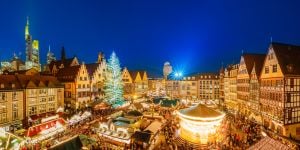Geography and demographics of Germany
The Federal Republic of Germany is the seventh-largest country by area in Europe and the largest country by population in the European Union. It is located in the central-western part of Europe, neighboring Denmark (to the north); Netherlands (to the northwest); Poland and the Czech Republic (to the east); Switzerland (to the south), and Belgium, France and Luxembourg (to the west). On the north and northwest, Germany has direct access to the North Sea and the Baltic Sea. Germany is also very green and has many forests. The Black Forest, or Schwarzwald, is an extensive mountain range in Baden-Württemberg, offering some of the most beautiful spots in Germany, including the 19th-century spa town Baden-Baden.
Germany's geographical position offers immense natural beauty. For example, no words would do any justice to Germany's stunning lakes and lakeshores. Königssee lake in Berchtesgadener Land is the deepest lake in Germany, offering spectacular scenery. Alpine lake Bodensee (also known as Lake Constance) is the biggest German lake and one of the best summer destinations in Germany. Other than being the third largest lake in Europe, Constance is lying on the river Rhine, one of the main rivers in Europe, and right next to the Alps. Lake Müritz dates back to the ice age, and its shore is the Müritz National Park, where hundreds of rare bird species live. Tegernsee crystal clear blue lake in the Bavarian Alps is a popular lake resort, inviting adventurers to hike, bike, and engage in other outdoor sports. Tegernsee's fun activities make it an ideal option for a family holiday or leisure time with friends in Germany.
Besides Berlin, Germany's capital city with more than 3.6 million inhabitants, the country has many important cities gaining expats and expats-to-be attention, including Hamburg, Munich, Cologne, Frankfurt, Stuttgart, Düsseldorf, and Dresden. Most German cities have a well-organised public transportation network, plenty of work and study opportunities, and a great cultural heritage. Compared to other European countries, Germany is relatively decentralised, and large cities can be reached easily by public transport or the renowned motorway (autobahn). The autobahn is a network of federal motorways, signified with the capital letter ‘A' followed by a number. There are main motorways crossing Germany, and shorter motorways of regional significance which are connecting two or more cities. Germany's autobahn has a total length of about 13,191 kilometres, compared only to the motorway systems in the United States and China.
*Tip: If you want to start your expat project in Germany, but don't know which city to choose, you can go through the Germany expat guide and find out more about each city. Or, you can raise your city-specific questions to the engaged and lively community of expats in the Germany forum. In general, Munich is known as Germany's most expensive city. Hamburg is famous for its tolerant and easy-going people, despite the rainy weather. Berlin is an alternative, hip, and trendy startup capital, whereas Stuttgart holds most job opportunities. Düsseldorf is in the middle of the Rhurpott (Ruhr valley), the industrial belt and most populated area in Germany.
The climate in Germany
Germany enjoys a temperate continental climate with warm summers and cold winters due to its geographical position. It is, in fact, in the Northern hemisphere's temperate zone and has a four-season climate. Summer usually lasts from May to October, with relatively high temperatures up to 35 degrees in the north and south. In winter, you are likely to experience cold air flows from Siberia, mist in the south, and humidity and continuous rains in the north. Long periods of snow or frost are rare except on the mountain and hill ranges.
The German language
The German language (Deutsch) is usually being criticized for its many grammar rules and syntax complexity, which make it difficult for expats to learn. It is the official language of Germany, Austria, and Switzerland (alongside French and Italian). German is spoken by more than 90 million people globally, making it one of the languages with the most native speakers. Hence, it is no surprise that it is studied with such zeal worldwide, and German citizens are so proud of it that they expect expats to speak it.
Every region in Germany speaks its own dialect of German, such as Bavarian or Low German, which may be a little tricky to understand initially. Some regions show strong identity and pride in the use of their dialects. Minority languages such as Danish, Frisian, Romany, or Sorbian are also spoken but often blend in with the local dialect.
Although most young people are very keen on speaking English, learning the language for work, administration, and everyday communication is mandatory. Some cities are exceptions, such as Berlin and Hamburg, where English is widely spoken. However, Germans always appreciate expats' efforts to learn the German language, which they consider a sign of respect towards their host country. Expats will quickly realize that the knowledge of German offers freedom, makes life easier, contributes to getting a job in Germany and earning a better salary.
Good to know:
The largest ethnic group of non-German origin is the Turks, making the Turkish language the second most spoken language in Germany.
Expatriation in Germany
Most German cities have a high concentration of expatriates from around the world; mainly Turkish, French, and British, but also American, Polish, and other Eastern European countries. Over the last few years, Germany has also hosted many refugees from areas of conflict, namely Syria. Among the most popular expat destinations are Berlin, Hamburg, Frankfurt, Stuttgart, Munich, and Düsseldorf.
Moving to Germany involves different procedures for different nationals, depending on their passport and purpose for travel. Visiting someone for the short-term is easier organised than moving to Germany for work, which requires a lengthy preparation of documents and a couple of visits to the German embassy or consulate. However, in any case, Germany's immigration policies are transparent, and there's always a person in charge to guide visa or residence applicants through the process.
German economy
Germany is considered to be the world's fourth-biggest and most powerful economy after the US, China, and Japan's economies. It is also deemed to be the European Union's largest economy, followed by the UK, France, and Italy. According to the World Bank, the German Gross Domestic Product (GDP) was worth USD 3.8 trillion in 2020. The country enjoys continuous economic growth due to efforts made by various national mechanisms.
The German economy is based on several pillars, such as trade, engineering, pharmaceutics, and more. In fact, the automotive, mechanical, electrical, chemical industry, trade, finance, information and communication technology fields are the country's leading job-creators and income generators. The industries offer some of the best research opportunities in Europe. Tourism, agriculture, hospitality, and catering also contribute significantly to the country's economy. Germany is home to many world-famous companies such as Siemens, Volkswagen, Bosch, Bayer, Audi, BMW, and Porsche.
Germany has a supportive social security system, which helps make it a very stable country with fewer inequalities between the rich and poor than in other European countries. This goes along with a relatively high tax rate of around 42% of the annual income.
Politics in Germany
Germany is a federal republic, consisting of 16 bundesländer or regions. Berlin is the country's federal capital city, hosting the German Parliament's headquarters. The Constitutional Court is located in Karlsruhe. The German parliament consists of two chambers: the Bundestag, which is elected every four years in a mixed system, and the Bundesrat, which is the Federal Council. The Bundesrat has a total of 69 votes of regional government representatives.
The President of the Federal Republic is elected for a five-year period, which is renewable once. Meanwhile, the Chancellor is elected for a four-year period and serves as the Head of the Government. Germany's role in the European Union and Economic European Area is pivotal. Germany was the founding member of the European Economic Community and the Eurozone. Also, the country is a member of the G7, G20, NATO, the United Nations, and OECD.
Good to know:
Over the past few years, Germany has reinforced environmentally friendly politics. Nearly a third of Germany is powered by renewable energy, and plans are to complete its nuclear power phase-out by 2022.
*Useful links:
We do our best to provide accurate and up to date information. However, if you have noticed any inaccuracies in this article, please let us know in the comments section below.






